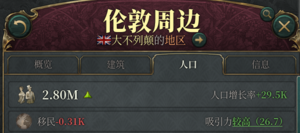移民是指人群在国家之间的流动。
移民种类
维多利亚3中有两种移民。
- 市场内移民是两个在同一市场的国家之间的人群的流动。人权法律决定了谁可以在市场里移民,自由人(无移民控制)、非受歧视人群(移民控制)或者不可移民(关闭边境)。根据两个省份的当地基础设施和市场接入度等因素,每周能够移民的人数不尽相同。
- 大规模移民是一种机制,它模拟了19世纪大量人口迁移到美国、巴西和澳大利亚等地的情况。当某一文化经历动乱时,大规模移民就会发生,这是拥有大量激进人口的产物。
移民吸引力
哪些人口从哪个省份迁移到哪个省份,取决于每个省份的移民吸引力。
移民吸引力是一个基于该省份平均生活水平的数值,并由各种因素修正,如人口过剩/不足,失业/可用工作等。一个国家可以通过 "青草运动 "法令直接鼓励移民到某个特定的省份,但要付出一定的![]() 权威力。States with a low population compared to the amount of available land are especially attractive to economic immigrants.
权威力。States with a low population compared to the amount of available land are especially attractive to economic immigrants.
In general, pops will move from states with a low standard of living and a lack of employment opportunities to states with a high standard of living and jobs to offer.
Discrimination
Discrimination also plays a role in migration. Pops that are being discriminated against in a particular state, and have the opportunity to migrate to another state in that market where they would not be discriminated against will take that opportunity in greater numbers, provided of course that there is an underlying economic reason for them to want to move there in the first place. This usually happens when multiple countries share the same market, and one of those countries having more liberal citizenship or religious laws.
Discrimination can also have the opposite effect: pops that are already enjoying full citizen rights are generally going to need to be in pretty dire economic straits to consider moving somewhere where those rights are going to be taken away. In the case of a pop that is going to be discriminated against no matter where they go in the market, they tend to stick to their cultural homelands.
Migration target
A culture that has enough turmoil to meet the threshold has a chance to create a ![]() migration target somewhere in the world, which is a flag set on a particular state that attracts huge numbers of migrants from that culture over the course of a limited timespan to that state and any states neighboring it. Migration targets are more likely to be created if the pops in the culture have a low standard of living and high literacy, and particularly likely to be created if there is widespread starvation among the pops of that culture.
migration target somewhere in the world, which is a flag set on a particular state that attracts huge numbers of migrants from that culture over the course of a limited timespan to that state and any states neighboring it. Migration targets are more likely to be created if the pops in the culture have a low standard of living and high literacy, and particularly likely to be created if there is widespread starvation among the pops of that culture.
The selection of states for migration targets is based on a number of factors, including the state's migration attraction, whether or not the culture is legally discriminated against in the country, and if there is a logical "path" that pops of the migrating culture would be able to follow from their homelands to the target (such as trade routes). There is no inherent advantage in certain country tags for who gets migrants -- the US tends to get migrations because of availability of jobs and land combined with liberal citizenship laws, not because they have a built-in migration attraction bonus.
Migration policy
Migration policy is a group of laws which sets the stance of the country on migration. For example, one can chose to promote the movement of people from their core lands to their colonies, attract skilled workers from other countries for their manufacturing economy, while another may prefer to just minimize all migration (external and internal) as a way of maintaining their iron grip over the population.
